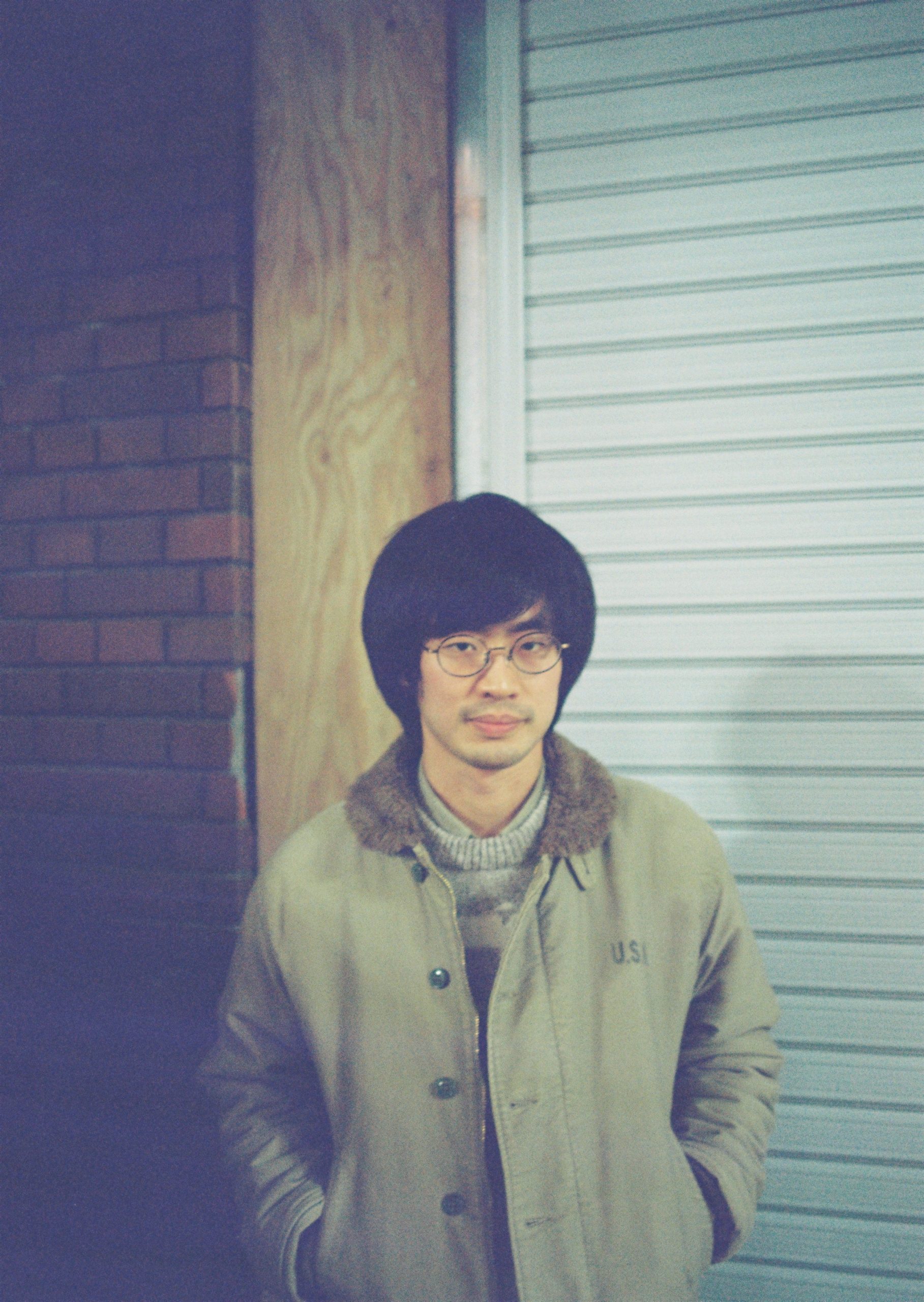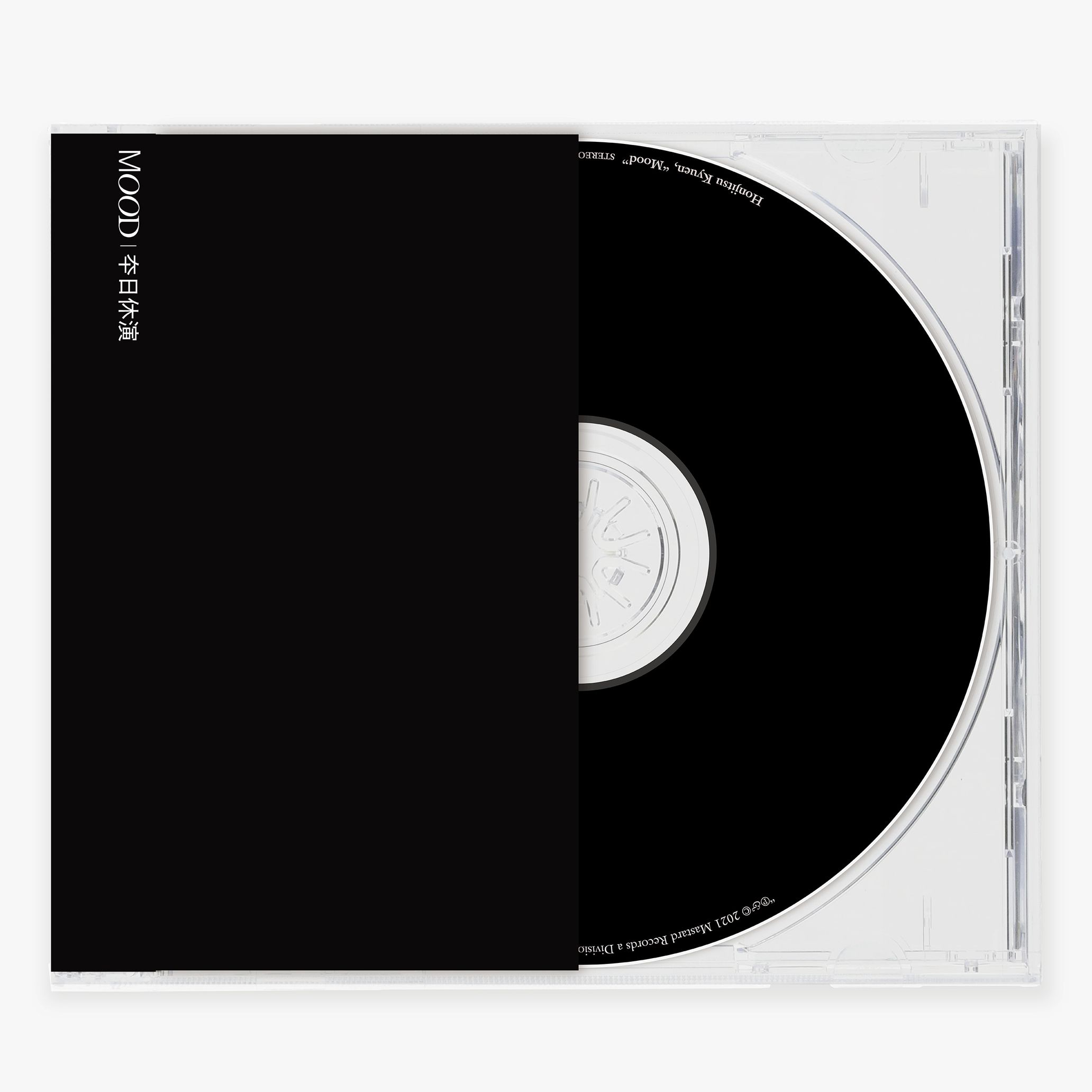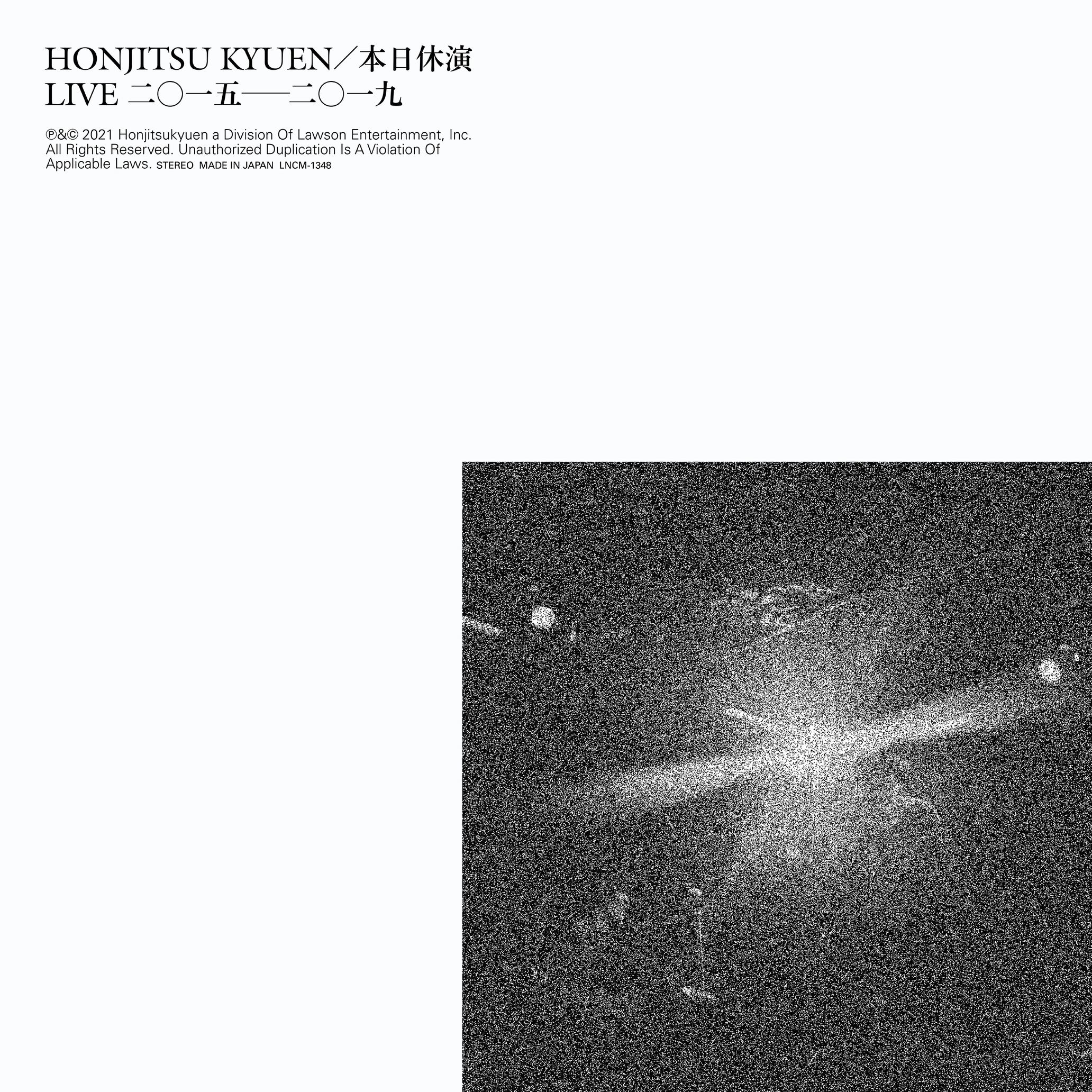Honjitsu Kyuen is a rock band based in Kyoto, that has been gaining broader support with its DIY-style and unprecedented musicality. In 2017, one of the members in the band, Toshihiro Noguchi (keyboard/vocal), suddenly passed away—despite the tragic incident, the band gallantly moved forward, done shows and made songs, and in the following year of 2018, they released their third album, I LOVE YOU. In the same year, the band appeared at the Fuji Rock Festival, putting on a passionate and emotional performance, and showing the new side of the band.
Later, guitar/vocal, Takuro Sato left and the band became a three-piece led by Takujyuro Iwade. Iwade has a vast experience in music and been in multiple bands including Sekkin-UFOs and Love Wonderland—the latest album of Honjitsu Kyuen that has recently been announced, MOOD, is imbued with Iwade’s eclectic paradigm, yet has become the most “straightforward” album he has ever crafted. Embodying the band’s cynical and genre-flipping qualities, the album is far from being obscure, and rather candid. Although it is textured with various music elements and has a robust attraction power, it is not omnidirectional nor amiable like their past releases; in fact, it turned out to be a minimal piece.
2. Live album LIVE2015 – 2019 will be released concurrently. It contains 8 songs selected from their live performances from 2015 to 2019. Same as MOOD, it is mixed and mastered by Soichiro Nakamura.
So, what are the background stories that brought changes to Honjitsu Kyuen? After hearing the stories from the frontman, Iwade, I discovered his deep trust and desire in “POP.”
——How would you describe your days, after you’ve released the previous album, I Love You?
Iwade: After we lost Noguchi in 2017, the four members, including [Takuro] Sato (guitar/vocal,) unanimously agreed to move forward; consequently, we performed really well at live shows, including Fuji Rock in 2018—However, we’ve gotten into a rut. Gradually, Sato was getting emotionally detached from music…he’s now pursuing his career as a programmer, but he says, “I’ll be back when I’m in the mood to do music again,” so I wouldn’t say he had left yet. Meanwhile, we’ve been looking for a new guitarist and keyboardist—but we’ve got no luck.
——After going through such situation, what made you three decide to create the new album?
Iwade: I had a chance to produce parts of Hirobumi Suzuki’s album, and that led Honjitsu Kyuen to perform at Hirobumi’s concert as a backband. We daringly performed, but it went way beyond what we had expected. After that, we’ve done our own live show and it was emancipating, as if we were free from encumbrance. [laughs] We had been concerned that it would sound poorly with only the three of us, but it was totally fine. I’ve liked music with minimal formation like reggae and dub, but I had never thought I’d be able to do that type of music myself. However, after the performance, I’ve realized that, as a matter of fact, I can.
——At the same time, you’ve also started another band, Love Wonderland, that performs lovers rock and reggae music.
Iwade: Yeah. Couple years ago, I suddenly started understanding those types of music. When I listened to artists such as Lee “Scratch” Perry and King Tubby, it hit me like, “Ah! This is it!” I feel like they are similar to the music that I’ve been into—music with ambiguous sound quality that is like a tape distortion—such as Les Rallizes Dénudés and Daisuke Tobari.
——So, you’re saying that you were impacted physically, rather than resonating to the concept of dub?
Iwade: Yeah. It simply felt “good.” Music nowadays would take the elements of a single genre, like reggae, and burnish it too much. Even if they assimilated the genre well on their own, they would interpret it to an extreme extent and end up missing out the important part.
——Regarding what you’ve just said, up until the previous album, it felt like the intellectual ideas of the band members were deftly complimenting one another; but for the latest album, it seems like you’ve stepped away from the old way and made the album more determined and objective.
Iwade: That’s true. We’d always thought that structuring is the most imperative part. We’ve always knew the importance of rhythm, however this time, we put more focus on it. Before, we were prone to embellish the sounds by adding details, yet for this album, we’ve limited the other sections and concentrated more on my rhythm guitar part.
——Also, the sonic images seem to have remarkably improved. Would you say that having Soichiro Nakamura was a big part of this?
Iwade: He was a huge part of it. Basically, we entrusted him with the basic settings including miking and sound production. Normally, we would apply EQ after recording—but this time, he had geared-up the respective instrument beforehand. He let us try out various types of amps, effectors, and guitars in the studio, which affected our performances and helped us define our direction—as well as, bestowing the sense of oneness to the album.
Make songs combined different elements naturally
——At the same time, it’s interesting how each song is mixed with multiple music genres, in the way I’ve never heard before—The genres are not concocted or absorbed, but they are rather conflated into one. For example, the first song of the album, “Uso no Tabi” has a traditional folk melody in the beginning but develops into a city-pop type of sound, and later, the boisterous fuzz guitar comes in.
Iwade: That’s right.
——Track 6, “Zenzen, Shizukana-Mama” is like Buddy Holly, including the way you sing, but has a chaotic bridge that reminds me of The Contortions. Do you constantly contrive and experiment ways to combine different elements together?
Iwade: I’m not seeking ways to “surprise people by doing something different.” It just happens to be that way. When I listen to music, I still use iPod, which plays different music seamlessly. It’s normal for me to listen to free jazz after listening to Buddy Holly; that’s how it’s always been, and I guess, this style reflects directly to the music I make. I’m not quite understanding what’s so special about doing something that is deemed “distinctive.” I’m also wondering why it needs to be looked at differently.
——Track 7, “Suna Otoko no Thema -Midnight Desert Surfin’-” is like Dick Dale playing the riffs of Captain Beefheart’s early songs…. The rhythm of the song is unique.
Iwade: The rhythm of the song comes from the music of the Tuareg people, who inhabit in the north-west part of the African continent. The type of music is called the “desert blues.” I’ve been a fan of the music for a while and incorporating its rhythm in every album.
——Usually, when different genres are mashed-up like this, a metafictional aspect inevitably seeps out; however, this album is an exception—it doesn’t really involve that particular aspect.
Iwade: Up until our second album, we were fervently saying, “no doubt, metafictional stuff is in now!” But suddenly, our minds changed like, “maybe being metafictional is corny?” [laughs] It’s hard to explain, but we just didn’t want to be exuding that “know-it-all” type of air. [laughs] So, we’ve started shifting towards being real and portraying the rawness of our performances.
“stay pop” and the worth of music as the intangible thing
——Also, the exquisite balance of avant-garde and pop, or the dynamism of the contrast between the two has become more significant in the latest album. The sounds are rambunctious, but at the same time, mellow. At first, these factors may seem conflicting, but they actually blend well with each other.
Iwade: Maybe it’s just the accumulation of different sounds. We wouldn’t want to think too hard about balancing different sounds, as it would only weaken the power of the songs. Simply, there are many people who are avant-garde and talented, but there are only handful of people who could play major 7th like The Contortions—and we happen to be one of the few. That’s why we sound like this. However, of course, we strive to “stay pop” as it’s the crucial part about us.
——So, why do you value “being pop” so much?
Iwade: Whenever I listen to music, I feel like I’m focusing on the songs or melodies more. I also like to feel the sound waves while I contemplate.
The songs in our latest album were written when I was anguishing with my relationship and being lost with my emotions. I was questioning myself like, “is this really how I’m supposed to feel when I’m in love…?” As I was ruminating, I started getting lost with other things too, such as about the world and what’s right and wrong. Even during those moments, I noticed that the physical sensations of ‘feeling pop melodies’ and ‘being in the groove’ were the only things certain.
——So, would you say that “being pop” is like a hub that connects yourself with the others…?
Iwade: I would think so. That’s maybe the reason why the music I make needs to be pop.
——Regarding the lyrics, they are overall jaded and nihilistic, yet contain sweet words that may seem nonsense, which reminds me of the pop songs that Phil Spector used to make. It’s fascinating how the lyrics are two-sided.
Iwade: I’m glad to hear that. I’ve been told that my lyrics are nihilistic, but that’s never intended. I think deep down, there’s this feeling of needing to live through life no matter what.
If it’s something you enjoy doing, it’s worth pursuing, even if it seems redundant to others.
——To break it down, I feel like playing music could be deemed as a meaningless and insignificant act from a utilitarian point of view, and it’s trying to figure out a way to become something exceptional or inviolable in society—I’m afraid, this might sound like an existential practice or something.
Iwade: I agree with your point. After all, music is a vital thing that enriches our society. However, these days, music itself is being expected too much, and people think it’s existing with a significant purpose to serve them. I get overwhelmed by listening to different types of music, as I feel their burden. When I see someone on TV commenting like, “this band has these characteristics, therefore, I think they are cool,” I just get annoyed…. [laughs]
——People add comments trying to describe the worth of the intangible thing, however, they are in fact taking its essences away…wait, I just realized that I might be doing the same thing.
Iwade: Well, I often think people who play music are also suffocating themselves by doing too much with it.
——This will be the last question—What are the benefits of being in a band, instead of being a solo musician?
Iwade: Simply, I don’t get sidetracked and lost when making music together with multiple people. Even if we went to an extreme level, before getting into sheer absurdity, we have this consistent groove that springs ourselves back to the ideal state. I think that’s the best part about being in a band. However, I hope we could challenge ourselves more boldly in the future.
Takujyuro Iwade
Born in 1992. Founded the band, Honjitsu Kyuen while studying in Kyoto University in 2012. He has released three records so far, Honjitsu Kyuen, Kemu-Wo-Make, and I Love You. He also produces music for other musicians, and has formed a band, Love Wonderland in 2018, with the concept, “lovers rock in the equinoctial week”—In 2020, the band released the album, Nagai Hiru.
Photography Takuroh Toyama
Translation Ai Kaneda







